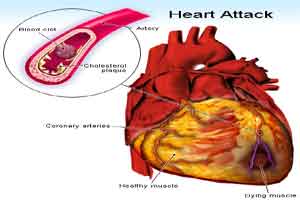- Home
- Editorial
- News
- Practice Guidelines
- Anesthesiology Guidelines
- Cancer Guidelines
- Cardiac Sciences Guidelines
- Critical Care Guidelines
- Dentistry Guidelines
- Dermatology Guidelines
- Diabetes and Endo Guidelines
- Diagnostics Guidelines
- ENT Guidelines
- Featured Practice Guidelines
- Gastroenterology Guidelines
- Geriatrics Guidelines
- Medicine Guidelines
- Nephrology Guidelines
- Neurosciences Guidelines
- Obs and Gynae Guidelines
- Ophthalmology Guidelines
- Orthopaedics Guidelines
- Paediatrics Guidelines
- Psychiatry Guidelines
- Pulmonology Guidelines
- Radiology Guidelines
- Surgery Guidelines
- Urology Guidelines
Breast implants impede ECG, lead to false heart attack diagnosis

Breast implants may impede an electrocardiogram (ECG) and could result in a false heart attack diagnosis, according to research presented at EHRA EUROPACE - CARDIOSTIM 2017.
"Our experience shows that breast implants make it difficult to see the heart with echocardiography because ultrasound cannot penetrate through the implant," said lead author Dr Sok-Sithikun Bun, a cardiologist at Princess Grace Hospital, Monaco. "We wanted to find out if implants also disrupt an ECG."
An ECG records the electrical activity of the heart and is used in the emergency department to diagnose the cause of chest pain. Several leads are attached to a patient at their legs, arms and chest to record the electrical activity from different angles.
This study investigated whether breast implants are associated with abnormal ECG recordings. The study included 28 women with breast implants and 20 women of the same age who did not have breast implants and served as a control group. All women were healthy and had no known structural heart disease.
ECGs were performed on all of the women. Each ECG recording was analysed by two experienced electrophysiologists who were unaware of any patient characteristics including age, sex, presence or absence of structural heart disease, presence or absence of breast implants, and so on.
For the control group, all ECG recordings were considered normal by one electrophysiologist. The other electrophysiologist classified the ECG recording of one woman as abnormal (5% of the total group). For the women with breast implants, one electrophysiologist classified 38% of the ECGs as abnormal and the second electrophysiologist classified 57% of the ECGs as abnormal.
"The main difference between the two groups of women was the breast implants so we think the abnormal ECG recordings were false readings due to the implants," said Dr Bun.
He continued: "Albeit echocardiography is difficult in women with implants, these measurements indicated that they had normal hearts and no structural heart disease, which suggests that there was no heart problem that could explain the abnormal ECGs."
ECGs are used to diagnose a heart attack by certain features, such as ST depression. The most frequent 'false' abnormality found in women with breast implants was T wave inversion from leads V1 to V4, followed by ST depression.
"T wave inversion is an unspecific sign but can indicate the presence of coronary artery disease, while ST depression indicates that a patient may have a heart attack," said Dr Bun. "Doctors could mistakenly conclude that a patient with breast implants has a manifestation of coronary artery disease if they believe in the false ECG findings. One possible explanation is that implants may be a barrier that disturbs transmission of the electrical activity from the heart to the lead."
"When a patient comes to the emergency department with chest pain an ECG is performed to see if they are having a heart attack," Dr Bun reiterated. "Doctors should be aware that ECG interpretation can be misleading in patients with breast implants. In case of any doubts regarding the diagnosis, blood tests need to be performed depending on the symptoms."
Dr Bun advised women with breast implants to inform their doctor before having an ECG. Women scheduled for breast implants could consider having an ECG beforehand so that they have one on file.
He said: "We do not want to frighten patients. But it may be wise to have an ECG before a breast implant operation. The ECG can be kept on file and used for comparison if the patient ever needs another ECG."

Disclaimer: This site is primarily intended for healthcare professionals. Any content/information on this website does not replace the advice of medical and/or health professionals and should not be construed as medical/diagnostic advice/endorsement or prescription. Use of this site is subject to our terms of use, privacy policy, advertisement policy. © 2020 Minerva Medical Treatment Pvt Ltd